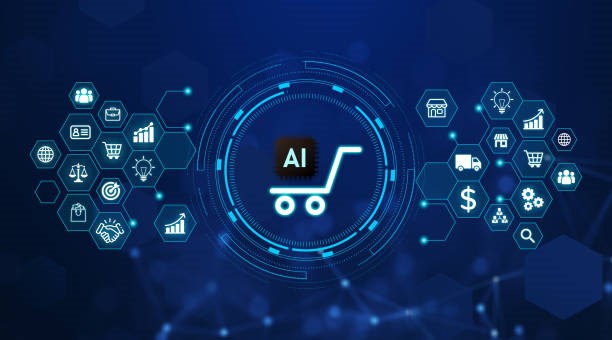A lot of positive innovation technology is fueling the development of personalizing AI in E-commerce. By applying advanced technology focused on simplicity and ease of use, AI personalization systems are now capable of transforming individual customer content and assisting with inventory management. Some of these processes also provide real-time assistance through integrated AI features.
Below are some areas of AI in E-commerce that it’s absolutely transforming in the industry:
Contents
Personalized Shopping Experience
Online retail initially comes up with the products viewed, bought, or searched before. But with the help of AI, computation gets tailored product recommendations based on their previous acts. Then it shows them products which the consumer is almost destined to buy. A personalized experience created this way has always increased chances of the user converting to a customer.
Chatbots and Virtual Assistants
AI c hates chatbots that function 24 hours a day and 7 days a week when it comes to answering customers’ queries. They can assist with user navigation, product availability, and even order tracking. It saves company time and provides a much improved user experience.
Inventory and Pricing Management
It makes it possible for AI to analyze and estimate any product which is likely to go out of stock and recommend restocking. It makes the automatic adjustment of prices in online stores with respect to demand, competitor prices, or seasonal trends – everything else that would run business more smoothly and profitably.
Fraud Detection and Cybersecurity
AI ensures safety from online frauds and shoppers alike: strange behaviors in purchases are detected, phony reviews arise, and risky transactions are all caught up. Thus, a safe and thoroughly dependable shopping experience for each shopper.
Visual Search and Voice Shopping
By such features as visual and voice search, AI has opened doors for exciting shopping experiences, enabling customers to, for instance, upload an image of an object they like and find similar things.
“In addition, voice shopping allows customers to simply speak into a device-enabled solution such as the Alexa from Amazon or Google Assistant to place an order with the retailer.”
Beacons are rapidly coming to the mainstream and the arsenal of technology that is changing people’s relationship with e-commerce sites as exciting innovations.
Perceivable Example: Amazon
Amazon tops the list where AI in E-commerce goes hand. It applies AI to do the following:
- Product recommendations on the homepage.
- Manage massive inventories with ease.
- Shopping via voice in Alexa.
- Detect frauds and fake reviews.
- AI provides millions of users across the world with a fast, smooth, and intelligent shopping experience.
Amazon delivers a seamless, intelligent shopping experience to millions globally — integrating innovations in technology at every stage.
Advantages of AI in E-commerce
- Faster Customer Service – Chatbots solve problems at once.
- Better Suggestions-Recommendations tell the kind of products shoppers would be interested in.
- More Sales-These are the kind of smart automation that earns businesses more money.
- Decreased Costs-AI enables the decrease in size of customer service or inventory teams.
- Secure Transactions- The AI can detect and block fraud attempts in no time.
Constraints to Think About
In view of the many advantages AI e-commerce, it has a few disadvantages that cannot be ignored.
- Privacy of Data: AI relies on adequate information about its customers to accomplish any level of effectiveness; hence businesses must be seen to protect such information.
- Costly to Set Up in the Beginning: Establishing AI tools is quite costly, especially in small shops.
- Staff Training: Staff members need to be trained for the proper use of AI.
However, these barriers are expected to fade as innovations in technology becomes more affordable and user-friendly.
Relation to AI in Entertainment
AI does not just limit its effects to shopping. Slowly, AI in entertainment. Platforms like Netflix and Spotify recommend shows and music based on your likes and dislikes using advanced algorithms. AI in e-commerce enhances user experience thus returning users.
Two industries have employed rather similar AI methods such as machine learning, data analysis, and automation to compete; and hence they share a lesson on how effectively AI can be put to use.
So, what does the future hold for AI in e-commerce? It will most likely include:
- More Human Interaction Like A Chatbot: Natural conversations and perception of emotions.
- Smarter Warehouses: Packaging and delivering items with the use of robots or AI systems.
- Augmented Reality (AR) try-on or placing items, such as furniture, at home through AI-powered AR.
- Hyper-Personalization: Every customer will have a unique homepage with personalized offers, discounts, and products.
These changes will improve the online shopping experience further for everyone.
Final Words
Without a doubt, AI in E-commerce is the future of online retail and not just a trend. It helps stores work smarter, allows shoppers to get what they want faster, and gives edge businesses competitive strength. With recent technological advancements, the shopping journey has become more personalized, efficient, and secure. Whether you’re a business owner or a frequent shopper, staying informed about future trends in digital commerce will help you adapt to changes and make the most of new opportunities. As technology reshapes both retail and entertainment, our ways of shopping, viewing, and interacting continue to evolve for the better.
